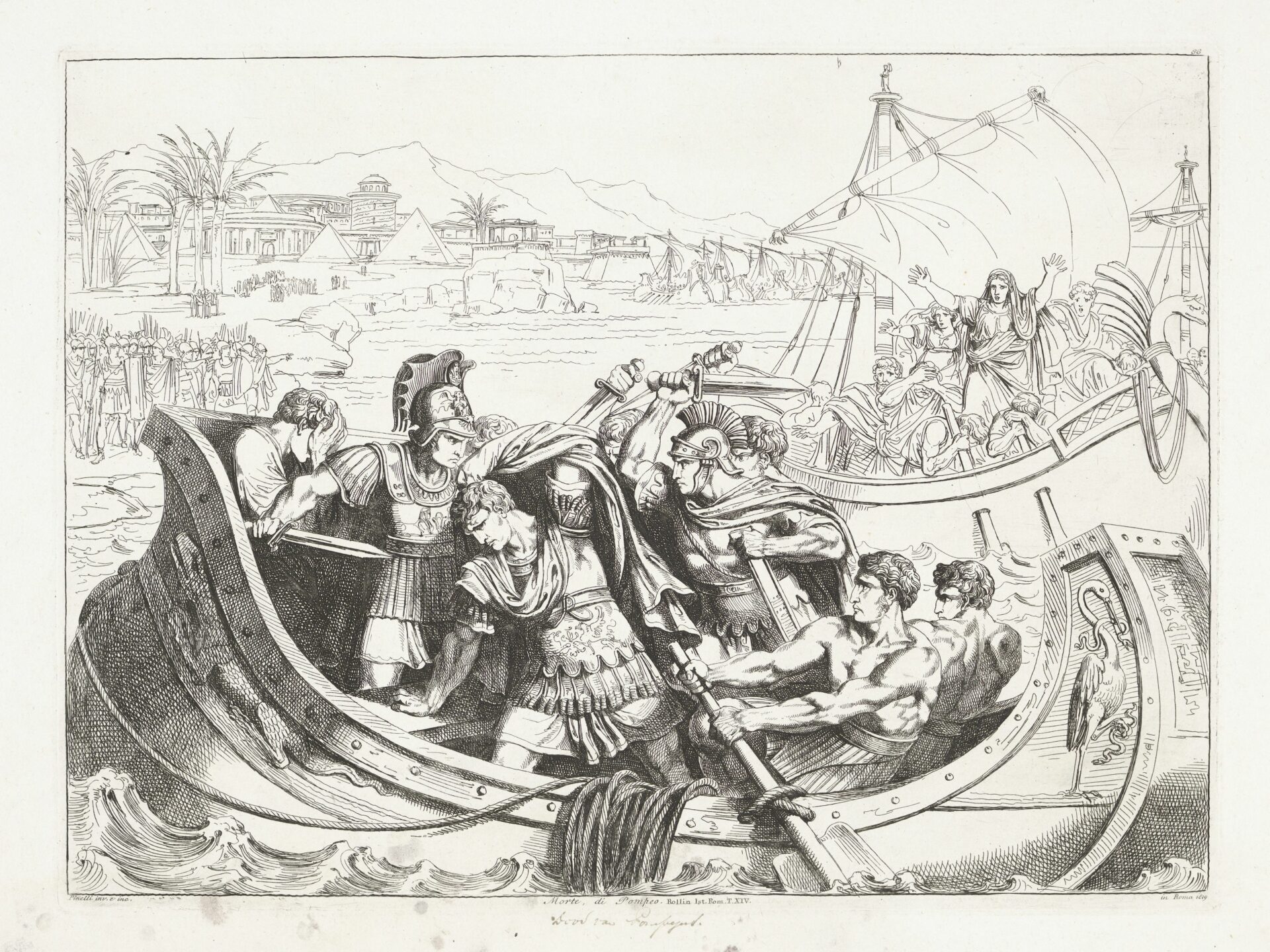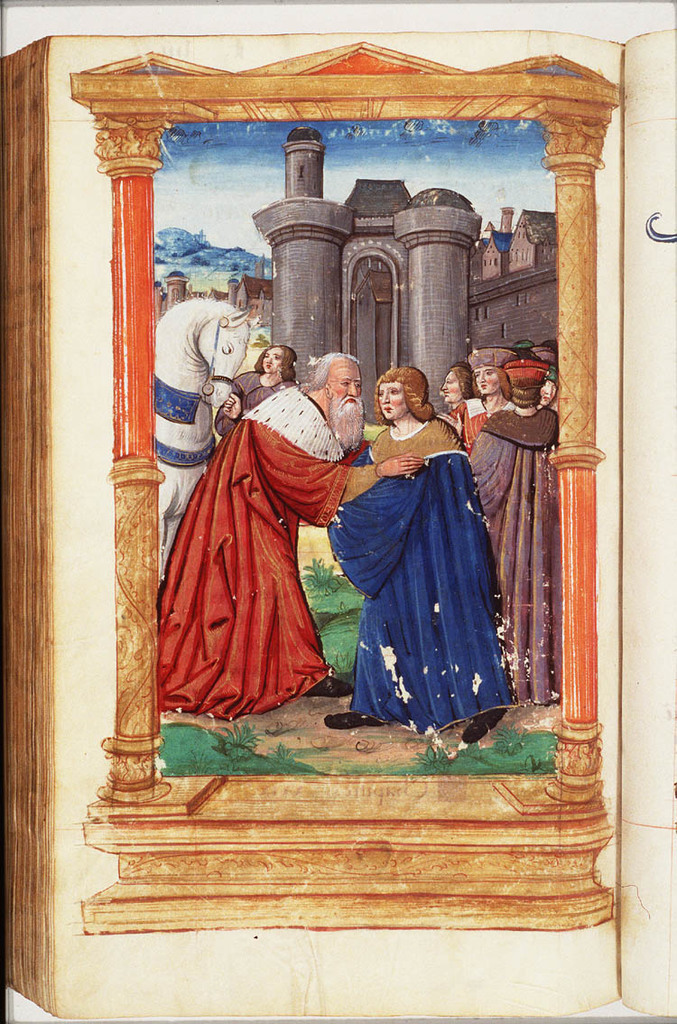Caesar in Greece
Propaganda in this war brought great results, starting with Caesar’s gentle treatment of prisoners after Corfinium, and the release of the army in Spain, and ending with the pardon after Pharsalus. Each of Caesar’s benevolences created more and more supporters among the opposing soldiers, so that changes of sides were frequent. Each victory brought help or friendly neutrality from the surrounding cities. Caesar treated the cities that opened their gates to him well, and massacred those that resisted him, which was also part of Caesar’s propaganda, and a warning to the opponents.
In small skirmishes between the two warring armies, Pompey’s was more often victorious, but he did not want a decisive battle. Pompey was always more cautious and wanted to starve the opponent, which would make his army fall apart by itself. He was constantly under pressure from his army commanders who wanted a quick victory. He was even called Agamemnon, i.e., “king of kings” because he supposedly enjoyed commanding so many powerful men.
During the summer, the battle of the city of Dyrrhachium took place, which Caesar tried to capture. Caesar’s army then suffered a heavy defeat and was in panic for some time. The army lost a significant number of insignia, and only Pompey’s caution saved Caesar. If he had dared to attack, Pompey could have entered Caesar’s camp, since even the guards left their posts in fear. It is believed that Caesar then said that the enemy could have won that day, if only he had a winner.
After this victory, Pompey’s entourage gained even more confidence, while Caesar decided to change strategy in order to force a decisive battle from Pompey. Namely, Caesar had since then constantly harassed the army of Pompey’s father-in-law Scipio Metellus, which was not strong enough to resist Caesar, and Pompey could either engage in battle or watch the destruction of his ally.
Prelude to the Decisive Battle
During the pursuit of Metellus’ army, Caesar encountered the inhospitability of the cities he passed by, which was the impact of the defeat at Dyrrhachium. The battle left such an impression that Pompey’s camp argued about the lifelong function of the high priest, which belonged to Caesar, believing that he would not survive the next battle. Only Pompey and Cato were against a decisive battle, Pompey out of caution and a strategy of anticipation, and Cato because of the loss of Roman citizens’ lives.
Pompey eventually agreed to a decisive battle and showed incredible self-confidence, expecting the battle to end in victory with minimal losses. It was believed that this was not the same army that Caesar had conquered Gaul, but a new and poorly manned army from all sides. Pompey and his father-in-law Scipio united their forces, and the final battle took place at Pharsalus in Thessaly on 9 August 48 BC.
Caesar was on the right wing of his army with the tenth legion, old and experienced soldiers in whom he had the most confidence from the Gallic Wars, while on the left wing was the man in whom Caesar had the most confidence, Mark Antony. On the left wing of Pompey’s army was Lucius Domitius, defeated at Corfinium, in the center was Scipio Metellus, and on the right wing was Gnaeus Pompey himself. The entire cavalry was on the left wing opposite Caesar’s main camp, since it was planned to win a quick victory with a decisive charge.
The Decisive Battle
Out of fear or strategy, Caesar called six cohorts to join the right wing from the rear. Pompey, as he had done many times before, used waiting tactics, which Caesar considered a mistake, saying that a charge delivers stronger blows and achieves a greater combat charge. Caesar’s army was older and more experienced, while Pompey’s, especially the cavalry, was young and still untrained in wars, and therefore Caesar ordered that the opposing cavalry be aimed at the face with spears so that they would lose morale due to fear of disfigurement, which happened and the cavalry rushed into panicked flight.
The six cohorts then surrounded Pompey’s army, and the battle was decided. Pompey left the battlefield, and Caesar treated the captured soldiers with mercy, including them in his legions, while the opposing soldiers who were not Romans were not so lucky and were executed. Caesar said that despite everything he had done for Rome, he would have been condemned by the Senate if he had not relied on his soldiers.
This sentence of Caesar reflects the change in Roman internal politics; it was no longer important who was the best speaker, and on whose side the Senate was, the most important thing was to have the strongest force with you, and that was how it was possible to rule Rome. That’s what Sulla did, that’s what Caesar did, that’s what Octavian did.
The battle itself claimed a large number of victims, and different estimates of the number of dead are given. In his “commentaries”, Caesar states 200 dead on his own side and 15,000 on the opposing side. After the battle, Caesar’s army was replenished with a large number of defected Pompey’s soldiers, among them Caesar’s future murderers Cassius and Brutus.

The End of the Civil War
After the battle, Pompey headed to Rhodes, where his wife Cornelia was. He tried to land in several places, but all the doors were closed to him because the news of the defeat at Pharsalus had come from everywhere before him. Finally, he landed in Alexandria, where he was tricked and killed on a ship, which was a sad end for the once great Pompey. Upon his arrival in Egypt, Caesar punished his murderers and gave his insignia to his wife, who returned to Rome, and then became involved in the struggle for the Egyptian crown between Ptolemy XIV and his sister Cleopatra.

Ptolemy was a minor, and Caesar, as a former ally of their father, decided that Cleopatra and Ptolemy would rule Egypt together. Ptolemy’s entourage did not want to accept this interference by the Romans, so the war lasted from November 48 to March 47 BC. Meanwhile, the remaining forces loyal to Pompey were gathering in Africa. The most prominent among them were Scipio Metellus, Cato, and King Juba. While Mark Antony was utterly unsuccessful in controlling Italy in Caesar’s name, Caesar crossed Syria to meet King Pharnaces, son of Mithridates VI, with whom he clashed at the Battle of Zena in the Pontus region.
A few weeks after leaving Egypt, Cleopatra gave birth to Caesar’s son Ptolemy Caesar, mockingly called Caesarion (Little Caesar). The battles with Pharnaces in August 47 BC were over so quickly and successfully that Caesar wrote in a letter only: “I came, I saw, I conquered.” Caesar spent the rest of the year in Rome, where he faced a mutiny in the army, which he successfully suppressed. The following year, Caesar crossed into Africa to clash with the remnants of Pompey’s army.
He ignored the bad predictions before leaving for Africa, and even interpreted them to his advantage. Caesar again did not wait for all the legions to arrive, but set out with three thousand men to capture the fortress of Thapsus. In the battle at this fortress on 6.4.46. BC, Caesar won another victory, which was the first defeat of a Scipio on African soil. Cato then committed suicide, not wanting to ask Caesar for forgiveness, as Cicero had done before.
Caesar would certainly have granted him forgiveness, but Cato did not want to give him that satisfaction. Principles were more important to him than his own life. Caesar was struck by the fact that he did not have the opportunity to decide on Cato’s life, which is one of the reasons for writing his Anti-Cato. The only opponents after this victory were Pompey’s sons in Hispania, but they could not pose a serious threat, yet the mere existence of a rebellious army in a Roman province, and under the command of the sons of his enemy, was a problem.

Caesar decided to solve this problem in early 45 BC. In this war, Caesar no longer had any mercy, as his opponents were treated as rebels and were killed en masse. Caesar no longer needed propaganda, as he was powerful enough. The leaders of the opposing army were Pompey’s sons Gnaeus and Sextus, and Attius Varus. The decisive battle was fought in March near Munda, where Caesar had much more cavalry, but despite this, the fighting was extremely difficult, and Caesar wrote after the battle that until then he had been fighting for victories, while in the battle of Munda he was fighting for his own life.
Caesar lost about a thousand soldiers, and his opponents thirty times as many. Pompey’s sons fled the battlefield, but Gnaeus Pompey the Younger was killed after a few days, while the destiny of Sextus Pompey is still a mystery. The battle of Munda marks the end of the civil war, and after that, Caesar had unlimited power as a dictator, and the republic existed only in name.
Sources and Literature:
The Cambridge Ancient History IX (2008),
Beard, M. (2015). SPQR: A History of Ancient Rome.
Caesar, Julius. (1953). War commentaries: De bello Gallico and De bello civili. London: New York: Dent; Dutton,
Plutarch. (1859). Plutarch’s Lives: translated from the original Greek, with notes, critical and historical, and life of Plutarch. New York: Derby & Jackson,
Morey, W. C. (1900). Outlines of Roman history: For the Use of High Schools and Academies,
Suetonius, approximately 69-approximately 122. (1883). The lives of the twelve Caesars. New York: R. Worthington.
Hello, my name is Vladimir, and I am a part of the Roman-empire writing team.
I am a historian, and history is an integral part of my life.
To be honest, while I was in school, I didn’t like history so how did I end up studying it? Well, for that, I have to thank history-based strategy PC games. Thank you so much, Europa Universalis IV, and thank you, Medieval Total War.
Since games made me fall in love with history, I completed bachelor studies at Filozofski Fakultet Niš, a part of the University of Niš. My bachelor’s thesis was about Julis Caesar. Soon, I completed my master’s studies at the same university.
For years now, I have been working as a teacher in a local elementary school, but my passion for writing isn’t fulfilled, so I decided to pursue that ambition online. There were a few gigs, but most of them were not history-related.
Then I stumbled upon roman-empire.com, and now I am a part of something bigger. No, I am not a part of the ancient Roman Empire but of a creative writing team where I have the freedom to write about whatever I want. Yes, even about Star Wars. Stay tuned for that.
Anyway, I am better at writing about Rome than writing about me. But if you would like to contact me for any reason, you can do it at contact@roman-empire.net. Except for negative reviews, of course. 😀
Kind regards,
Vladimir
